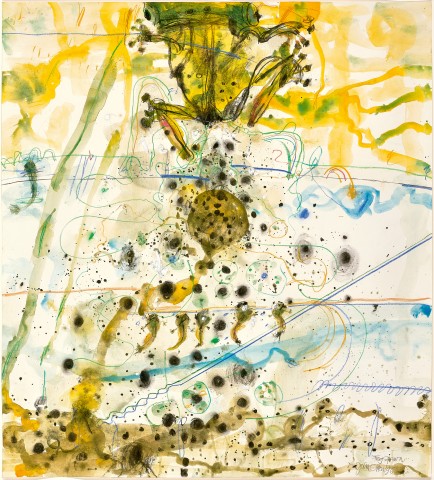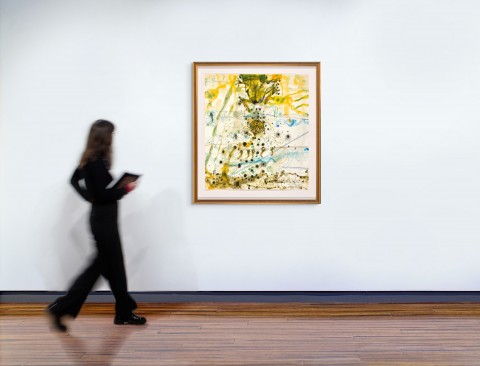FROG SPAWN, 1996
JOHN OLSEN
watercolour, pastel and gouache on paper
100.0 x 89.5 cm
signed, dated and inscribed with title lower right: Frog Spawn / John Olsen ‘96
Maunsell Wickes, Sydney
Private collection, Sydney, acquired from the above c.1998
We are grateful to Kylie Norton, Editor, John Olsen Catalogue Raisonné, for her assistance with this catalogue entry.
‘The urge for life is a staggering thing and we just ought to take notice… There is such fecundity in this universe called a lily pond.’1
Upon the invitation of film-makers Ken Duncan and Robert Raymond, and esteemed naturalist Vince Serventy, John Olsen first ventured to the Australian interior in the early 1970s to participate in the ‘Wild Australia’ film series commissioned by the Australian Broadcasting Commission. Immediately awestruck by the incredible diversity of the various ecosystems he encountered during the journey, Olsen thus began his enduring fascination with observing and painting the teeming life of rainforests, wetlands, estuaries and lily ponds – stimulated not only by individual species, but a sense of the whole, pulsating mass, ‘a carnival of life’. Indeed, Olsen’s sheer wonderment at the miracle of mother nature and her life-affirming properties is especially palpable in his reflections upon travelling to Lake Eyre in 1974 where he witnessed the arid, salt-encrusted plains of the South Australian desert erupting into life following the extraordinary floods of 1973 (only the second such occurrence since white settlement); ‘… I draw studies of insects, animals and birds that will eventually be realised as prints and watercolours. My devotion to Chinese art and philosophy finds a fulfilment in this experience. Nothing too small or too strange should escape my attention – an insect’s wing, the leap of a frog, the flight pattern of dragonflies. They all induce poetic rapture.’2 Equally too, Olsen became acutely aware of the vast cycle of death that ensued when the water receded – thus reiterating his Taoist belief in the total interconnectedness of all living forms and heralding a new spirituality in his art.
Over the subsequent two decades, Olsen would continue his devotion to this fertile watery world with repeated visits to Lake Eyre and North Queensland providing the impetus for some of his most lyrical interpretations of the Australian landscape. Encouraging the viewer to appreciate the relationship between the tiny and the vast, the microcosm and the macrocosm, Frog Spawn, 1996 is an enchanting example of such works on the subject from his mature period. Now confronted with the realities of old age, significantly Olsen does not abandon hope in the redemptive, life-enhancing possibilities of nature; to the contrary, he embraces the principle of ecological integration and its capacity to enliven the spirit. As he poignantly mused in 1993, ‘A search for completeness and ecstasy so lacking in our time. Probably will fail… Examination of different frogs, some sleek and streamlined with delicate fingers. Tiny tree frogs that hang from wet leaves, green on top and yellow underbelly, with spongy pads on feet and hands.’3 With joyous abandon, Olsen thus here eloquently captures the essential energy and agility of this tiny amphibian in the very act of spawning life – all the while bathing the work in broad washes of ochre, olive and opalescent blue to evoke the jewel-like richness of this fragile universe he so revered.
1. John Olsen, cited in Hart, D., John Olsen, Craftsman House, Sydney, 1991, p. 123
2. John Olsen, cited in Olsen, J., Drawn from Life, Duffy and Snellgrove, Sydney, 1997, p. 116
3. ibid., pp. 307 – 308
VERONICA ANGELATOS


